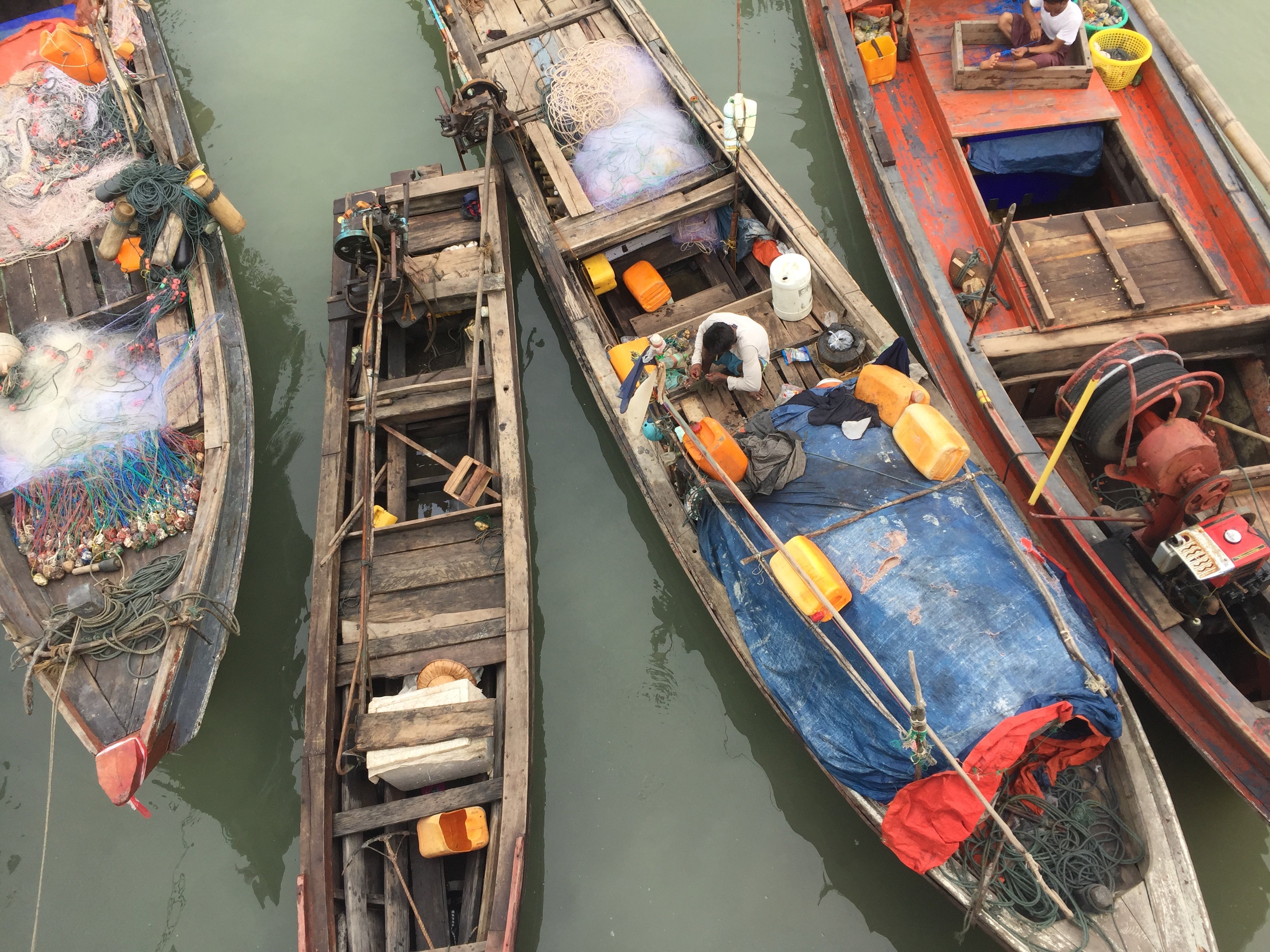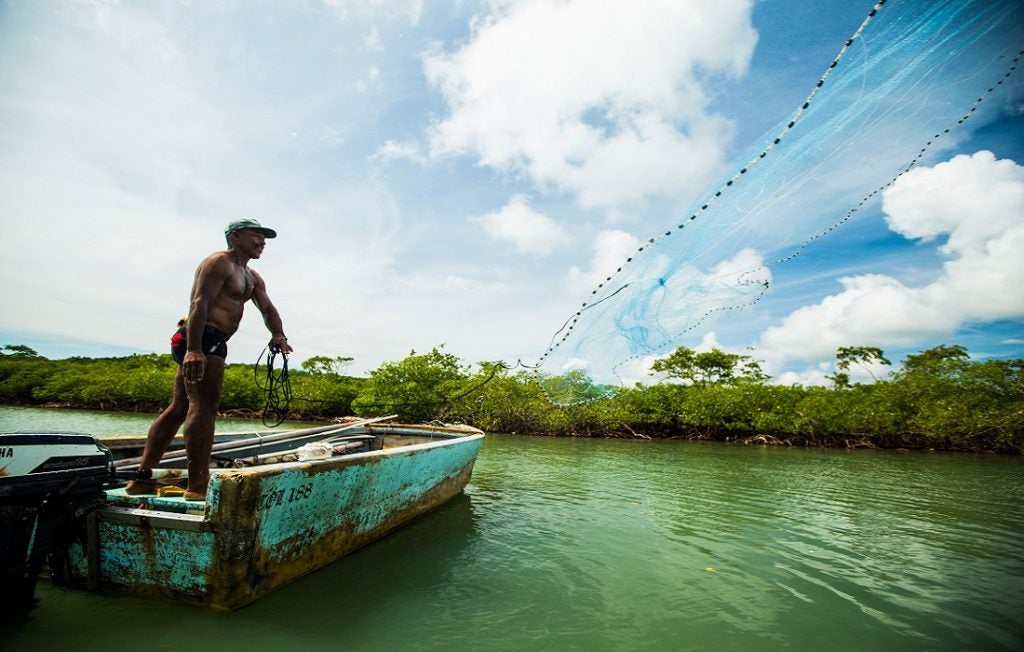 Editor’s note: This is the last in a multi-part blog series, Fisheries for the Future, examining the impacts from climate change on global fisheries and the opportunities to address these emerging challenges. Throughout the series, we have investigated how climate change will impact the world’s supply and distribution of fish and what we can do to ensure the most sustainable future for ourselves and our planet. Learn more about this work: Resilient Seas
Editor’s note: This is the last in a multi-part blog series, Fisheries for the Future, examining the impacts from climate change on global fisheries and the opportunities to address these emerging challenges. Throughout the series, we have investigated how climate change will impact the world’s supply and distribution of fish and what we can do to ensure the most sustainable future for ourselves and our planet. Learn more about this work: Resilient Seas
Climate change is here and can only get worse. This promises to scramble the oceans in ways we do not yet fully understand, and it poses nothing short of an existential risk to marine ecosystems and the people that rely upon them for livelihoods and food security. Yet, the future is not without hope. If we can stem emissions, there is reason to believe that the sea can continue to host abundant and diverse life and support the economic, social and food needs of society. But we must get started now.
As we wrap up this series, multiple efforts are underway — or have recently commenced — to move global society to address the effects of climate change on fisheries. Just this fall, we have seen the importance of addressing climate change in fisheries highlighted in the IPCC Special Report on the Ocean and Cryosphere in a Changing Climate, at events during UN Climate Week, at the FAO International Symposium on Fisheries Sustainability, and shortly, at COP25 (often referred to as the “Blue COP”). Early next year the High Level Panel for a Sustainable Ocean Economy will release its findings. These high-visibility global events are serving a much-needed purpose in raising the specter of this issue and motivating global society toward constructive change. The question, of course, is “how will society react?”
In this series, we have drawn upon our experiences to outline several key priorities, focus areas and strategies that practitioners around the world can embrace in order to build more resilient fisheries and to ensure that society reacts in the most constructive manner possible. These key priorities, focus areas and strategies can be described as:
- Ensure effective fishery management and governance is in place
Addressing climate change effects on ocean fisheries will require a certain level of fishery management sophistication. This means that, in places where effective management and governance does not yet exist, the first step must be the establishment of effective management and governance and the implementation of best practice. Without it, there’s very little that can be done to address climate change effects.
- Anticipate and plan for future change
Looking ahead and planning for the future can help us avoid problems that may otherwise arise. When we look toward the future, we should ask ourselves whether all aspects of management and governance systems are set up appropriately in the face of future change. For instance, we should ask ourselves questions like: Are our existing fishery management goals appropriate? Are management plans focused on the correct geographies? Are scientific evaluation tools set up in ways appropriate for future conditions? Are management benchmarks appropriate for future conditions? What sort of conflicts (allocation or otherwise) will arise in a future world? And, what sort of risks does the future hold in store to the integrity of the management system? By anticipating these changes ahead of time, we can begin the important process of adaptation and transition before problems occur.
- Enhance international cooperation
Most fish stocks are expected to move as a result of climate change, and this means that the geographic scale of management must change along with it if we hope to manage stocks sustainably across their range. That means we must get better at international cooperation. Fortunately, there are successful models that we can learn from.

- Build general resilience of the ecosystem to help respond to the unknown
We must humbly acknowledge two important aspects of climate change: 1) That there is a lot we do not know about how climate change will unfold, and 2) it would be impossible for mankind to manage all consequences of climate change even if we could foresee them. When we acknowledge these realities, the rational response is to help ensure marine ecosystems are made resilient. This means elevating the importance of things like genetic and biological diversity, habitat complexity and connectivity, ensuring adequate population sizes of marine species and more. By bolstering these kinds of resilience attributes in marine systems, we can help that system to resist and recover from climate-related shocks — including those that we do not anticipate.
- Use the principles of fairness and equity to drive policy decisions
Inequity is already a concern at global and local levels and climate change promises to exacerbate these problems, with societies in developing equatorial nations standing to suffer the most severe consequences. Such inequity of effects raises many moral issues, especially when we consider that many places that will suffer from climate change are the places that have contributed the least to it. Therefore, working to address and reverse these inequities is simply the right thing to do. However, issues of inequity and fairness also relate directly to the acceptance and durability of sustainable fishery management systems. In the face of climate change, we will be asking large swaths of society to make large adaptations and transformations as the ocean system changes around us. History shows us that society is far more likely to embrace and continue to support these kinds of changes when society perceives the process as fair and the outcomes are equitable. Thus, addressing issues of fairness and equity are important for two reasons: 1) it’s a moral obligation on the part of the developed world, and 2) our success at implementing climate-smart fishery management depends on it.
While shifting standard approaches to align with these key strategies may seem complicated, in reality, learning and adapting are an inherent part of effective fishery management. Indeed, many would say that the ideal governance system would be based on ecosystem-based adaptive management, which inherently relies on flexibility and improvements through time. However, climate change will release greater and faster changes than expected, requiring more nimble adaptation. As events unfold, we will need to view them as learning opportunities and adapt management, science and monitoring in ways commensurate with that experience. This will help us to continually get better at refining our approaches to fisheries management in the face of climate change.
Doing all of this on a global scale is a tall order. However, the fact is that we are already doing these things in many places. As we do so, we are learning a great deal from these experiences that we can use to help advance climate-smart fishery reforms elsewhere.









